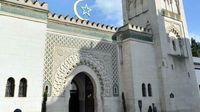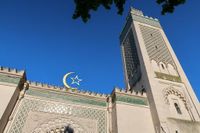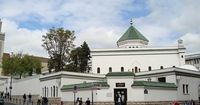The Grande Mosquée de Paris announced on Saturday, March 29, 2025, that Aïd el-Fitr will take place on Sunday, March 30, 2025. This date aligns with the one set by the French Council of Muslim Worship (CFCM), marking the end of Ramadan, a month of fasting and reflection for Muslims around the world.
As millions of Muslims in France prepare for this significant celebration, the Grande Mosquée has organized two prayer sessions for Aïd el-Fitr: the first at 8:00 AM and the second at 8:45 AM. This decision comes in anticipation of the large crowds expected to gather in the 5th arrondissement of Paris.
The announcement was made during the traditional "seconde nuit du doute," or second night of doubt, where religious authorities observe the moon to determine the precise date of the end of Ramadan. The commission at the Grande Mosquée, which included representatives from several national Muslim federations, confirmed the visibility of the new moon, thus finalizing the date for the festival.
"Our religious commission met at the Grande Mosquée de Paris with several national Muslim federations… The commission observed the possibility of sighting the new moon, and thus determined the date of Aïd el-Fitr to be Sunday, March 30, 2025," the mosque stated in a communiqué.
In contrast, the CFCM utilizes scientific data to predict lunar phases, which sometimes leads to discrepancies in the announcement of religious dates. This year, the CFCM set the Zakat al-Fitr, the obligatory charity given to the needy before the Aïd prayers, at 9 euros, while the Grande Mosquée has set it at 7 euros. This difference reflects the varying interpretations and methods used by the two institutions.
The Zakat al-Fitr is a crucial part of the Aïd el-Fitr celebration, emphasizing the importance of charity and community support. Muslims are encouraged to pay this alms before the Aïd prayers to ensure that all members of the community can partake in the celebrations, regardless of their financial situation.
As Aïd el-Fitr approaches, it serves as a reminder of the values of generosity, gratitude, and togetherness that are central to the Islamic faith. The festival not only marks the end of fasting but also celebrates the spiritual growth and discipline that come with Ramadan.
Following Aïd el-Fitr, Muslims in France will look forward to another significant celebration, Aïd al-Kebir, which will occur in approximately seventy days. This festival, also known as the "great feast," commemorates the willingness of Ibrahim (Abraham) to sacrifice his son in obedience to God and is marked by communal prayers, feasting, and acts of charity.
The Aïd al-Kebir will involve ritual animal sacrifices, typically of sheep, and is a time for family gatherings and sharing meals with those in need. It is celebrated on the 10th day of Dhu al-Hijjah, the last month of the Islamic calendar, which follows the completion of Hajj, the pilgrimage to Mecca.
As the community gathers for Aïd el-Fitr, the atmosphere is expected to be one of joy and festivity, with families donning new clothes and sharing traditional meals. This celebration is not only a religious observance but also a cultural event that strengthens bonds among family and friends.
In conclusion, the announcement of Aïd el-Fitr on March 30, 2025, by the Grande Mosquée de Paris marks a significant moment for the Muslim community in France. As preparations for the celebrations unfold, the emphasis on charity and community spirit highlights the core values of Islam, fostering a sense of unity and shared purpose among Muslims.









